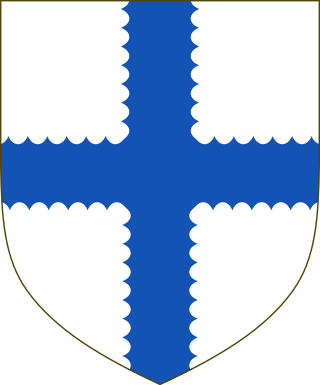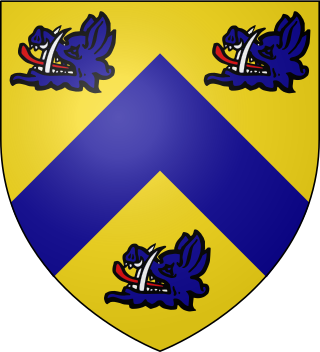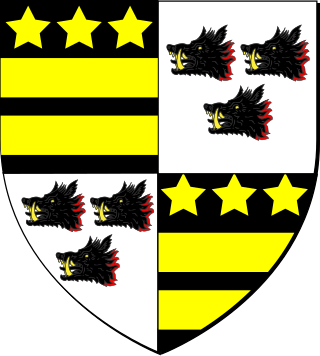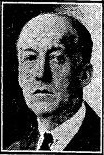Related Research Articles

Baron Berners is a barony created by writ in the Peerage of England.

Earl of Meath is a title in the Peerage of Ireland. It was created in 1627 and is held by the head of the Brabazon family.

Lord Sinclair is a title in the Peerage of Scotland. According to James Balfour Paul's The Scots Peerage, volume VII published in 1910, the first person to be styled Lord Sinclair was William Sinclair, 3rd Earl of Orkney and 1st Earl of Caithness. However, according to Roland Saint-Clair writing in the late 19th century, William Sinclair's father, Henry II Sinclair, Earl of Orkney, who died in 1420, is the first person recorded as Lord Sinclair by public records.

Lord Rollo, of Duncrub in the County of Perth, is a title in the Peerage of Scotland. It was created on 10 January 1651 for Sir Andrew Rollo, with remainder to his heirs male whatsoever. His great-great-grandson, the fifth Lord, was a Brigadier-General in the Army and fought in North America during the Seven Years' War. He died without surviving male issue and was succeeded by his younger brother, the sixth Lord. His grandson, the eighth Lord, sat in the House of Lords as a Scottish Representative Peer from 1841 to 1846. His son, the ninth Lord, was a Scottish Representative Peer from 1847 to 1852. His son, the tenth Lord, sat in the House of Lords as a Scottish Representative Peer from 1860 to 1868. On 29 June 1869 he was created Baron Dunning, of Dunning and Pitcairns in the County of Perth, in the Peerage of the United Kingdom, with remainder to the heirs male of his body. This title gave the Lords an automatic seat in the House of Lords until 1999. As of 2017 the titles are held by the tenth Lord's great-great-grandson, the fourteenth Lord, who succeeded his father in 1997. He is the hereditary Clan Chief of Clan Rollo.

Viscount Gormanston is a title in the Peerage of Ireland created in 1478 and held by the head of the Preston family, which hailed from Lancashire. It is the oldest vicomital title in the British Isles; the holder is Premier Viscount of Ireland.

Viscount Massereene is a title in the Peerage of Ireland. It was created in 1660, along with the subsidiary title of Baron Loughneagh. From 1665 to 1816 the Skeffington Baronetcy of Fisherwick was attached to the viscountcy and from 1756 to 1816 the Viscounts also held the title of Earl of Massereene. Since 1843 the peerages are united with titles of Viscount Ferrard, of Oriel and Baron Oriel, both in the Peerage of Ireland, and Baron Oriel, in the Peerage of the United Kingdom. The Viscount also holds the subsidiary titles of Baron Loughneagh (1660) and Baron Oriel (1790) in the Peerage of Ireland and Baron Oriel (1821) in the Peerage of the United Kingdom. As Baron Oriel, he sat in the House of Lords until 1999.

Viscount Gage, of Castle Island in the County of Kerry of the Kingdom of Ireland, is a title in the Peerage of Ireland. It was created in 1720 for Thomas Gage, along with the subsidiary title of Baron Gage, of Castlebar in the County of Mayo, also in the Peerage of Ireland. In 1744 he also succeeded his cousin as eighth Baronet, of Firle Place. The titles remain united. The Gage family descends from John Gage, who was created a baronet, of Firle Place in the County of Sussex, in the Baronetage of England on 26 March 1622. His great-grandson, the seventh Baronet, represented Seaford in Parliament. He was succeeded by his first cousin, Thomas Gage, 1st Viscount Gage, the eighth Baronet. He sat as a Member of Parliament for Minehead and Tewkesbury and also served as Governor of Barbados. In 1720, 24 years before succeeding in the baronetcy, he was raised to the Peerage of Ireland as Baron Gage and Viscount Gage. His second son was the military commander the Hon. Thomas Gage.

The title Baron of Dunsany or, more commonly, Lord Dunsany, is one of the oldest dignities in the Peerage of Ireland, one of just a handful of 13th- to 15th-century titles still extant, having had 21 holders, of the Plunkett name, to date. Other surviving medieval baronies include Kerry, Kingsale, Trimlestown (1469), Baron Louth, and Dunboyne.

Baron Carbery, of Carbery in the County of Cork, is a title in the Peerage of Ireland. It was created in 1715 for George Evans, with remainder to the heirs male of his father and namesake George Evans, a supporter of William and Mary during the Glorious Revolution, who had earlier declined the offer of a peerage. After his elevation to the peerage, Lord Carbery represented Westbury in the House of Commons. He was succeeded by his eldest son, the second Baron. He also sat as Member of Parliament for Westbury. His grandson, the fourth Baron, briefly represented Rutland in Parliament. He was succeeded by his uncle, the fifth Baron. On his death, the line of the eldest son of the first Baron failed. He was succeeded by his first cousin once removed, the sixth Baron, who had previously succeeded his father as second Baronet, of Castle Freke. Lord Carbery sat in the House of Lords as an Irish Representative Peer from 1824 to 1845. His nephew, the eighth Baron, was an Irish Representative Peer from 1891 to 1894. As of 2014 the titles are held by the latter's great-great-grandson, the twelfth Baron, who succeeded his father in 2012.

Baron Muskerry is a title in the Peerage of Ireland. It was created in 1781 for Sir Robert Deane, 6th Baronet. He had previously represented County Cork in the Irish House of Commons.

Baron Bellew, of Barmeath in the County of Louth, is a title in the Peerage of Ireland. It was created on 17 July 1848 for Sir Patrick Bellew, 7th Baronet, who had previously represented Louth in the House of Commons as a Whig and also served as Lord Lieutenant of County Louth. His grandson, the third Baron, was also Lord Lieutenant of County Louth and sat in the House of Lords as an Irish Representative Peer from 1904 to 1911. He was succeeded by his younger brother, the fourth Baron. He was an Irish Representative Peer from 1914 to 1931. In 1881 Lord Bellew assumed by Royal licence the additional surname of Bryan under the terms of the will of his maternal uncle Colonel George Bryan. However, he is the only one of the Barons to have held this surname. On his death the titles passed to his nephew, the fifth Baron, and then to his younger brother, the sixth Baron. As of 2018 the titles are held by the latter's grandson, the eighth Baron, who succeeded in 2010.

Baron Ellenborough, of Ellenborough in the County of Cumberland, is a title in the Peerage of the United Kingdom. It was created on 19 April 1802 for the lawyer, judge and politician Sir Edward Law, Lord Chief Justice of the King's Bench from 1802 to 1818. His son, the second Baron, notably served as Governor-General of India. On 22 October 1844 the second Baron was created Viscount Southam, of Southam in the County of Gloucester, and Earl of Ellenborough, in the County of Cumberland. These titles were also in the Peerage of the United Kingdom. His only son predeceased him and on his death in 1871 the viscountcy and earldom became extinct.
Baron Amwell, of Islington in the County of London, is a title in the Peerage of the United Kingdom. It was created on 16 July 1947 for the Labour politician Frederick Montague. He had previously represented Islington West in the House of Commons and served as Under-Secretary of State for Air from 1929 to 1931. As of 2010 the title is held by his grandson, the third Baron, who succeeded his father in 1990.
Baron Wedgwood, of Barlaston in the County of Stafford, is a title in the Peerage of the United Kingdom. It was created in 1942 for the soldier and politician Josiah Wedgwood. He was the great-great-grandson of Josiah Wedgwood, the founder of the Wedgwood pottery dynasty. As of 2023, the title is held by the first Baron's great-grandson, the fifth Baron, who succeeded his cousin in 2014.

Baron Ponsonby of Shulbrede, of Shulbrede in the County of Sussex, is a title in the Peerage of the United Kingdom. It was created in 1930 for the politician Arthur Ponsonby. Ponsonby was the third son of General Sir Henry Ponsonby and the great-grandson of Frederick Ponsonby, 3rd Earl of Bessborough. Frederick Ponsonby, 1st Baron Sysonby, was his elder brother. The first Baron's grandson, the third Baron, was also a Labour politician and notably served as Opposition Chief Whip in the House of Lords in the 1980s. As of 2017 the title is held by the latter's only son, the fourth Baron, who succeeded in 1990. He sat on the Labour benches in the House of Lords prior to the passing of the House of Lords Act 1999, when he lost his seat. However, in 2000 he was given a life peerage as Baron Ponsonby of Roehampton, of Shulbrede in the County of West Sussex, and was able to retake his seat in the House of Lords.
Baron Bridges, of Headley in the County of Surrey and of Saint Nicholas at Wade in the County of Kent, is a title in the Peerage of the United Kingdom. It was created on 4 February 1957 for the prominent civil servant Sir Edward Bridges. He was Cabinet Secretary from 1938 to 1946. He was succeeded by his son, the second Baron, in 1969. He notably served as British Ambassador to Italy from 1983 to 1987. Lord Bridges was one of the ninety-two elected hereditary peers that remained in the House of Lords after the passing of the House of Lords Act 1999, before his removal for non-attendance in 2016. As of 2017 the title is held by his son, the third Baron, who succeeded to the title in that year. He is the solicitor to, among others, Queen Elizabeth II of the United Kingdom and other members of the Royal family. The first Baron was the son of poet laureate Robert Bridges. The first Baron's grandson and current Baron's cousin was created a Life Peer as Baron Bridges of Headley.

Baron Ravensdale, of Ravensdale in the County of Derby, is a title in the Peerage of the United Kingdom.
Baron Lyveden, of Lyveden in the County of Northampton, is a title in the Peerage of the United Kingdom. It was created in 1859 for the Liberal politician Robert Vernon. Before 1859 he was known as Robert Vernon Smith. He was succeeded by his eldest son, the second Baron. When he died the title passed to his nephew, the third Baron. He was the son of Reverend the Hon. Courtenay John Vernon, third son of first Baron. On the death of his son, the fourth Baron, in 1969, this line of the family failed. The late Baron was succeeded by his second cousin, the fifth Baron. He was the grandson of the Hon. Greville Richard Vernon youngest son of the first Baron. As of 2018 the title is held by his great-grandson, the eighth Baron, who succeeded his father in 2017. Lord Lyveden lives in New Zealand.
Oliver Plunkett, 1st Baron Louth, was an Irish peer.
Thomas Bathe, 1st Baron Louth was an Irish peer, barrister and judge of the fifteenth century. Even by the standards of that turbulent age, he had a troubled and violent career. He was deprived of his estates and outlawed by Act of Parliament, but was later restored to favour. His claim to the title Baron Louth was eventually recognised by the English Crown, and he ended his career as Chief Baron of the Irish Exchequer.
References
- ↑ "Telegraph Announcements – Lord Louth". The Daily Telegraph. London. Retrieved 11 January 2013.
- ↑ Morris, Susan; Bosberry-Scott, Wendy; Belfield, Gervase, eds. (2019). "Louth, Baron". Debrett's Peerage and Baronetage. Vol. 1 (150th ed.). London: Debrett's Ltd. pp. 2251–2254. ISBN 978-1-999767-0-5-1.
- Kidd, Charles, Williamson, David (editors). Debrett's Peerage and Baronetage (1990 edition). New York: St Martin's Press, 1990.
- Leigh Rayment's Peerage Pages [ self-published source ][ better source needed ]
- Louth Papers
